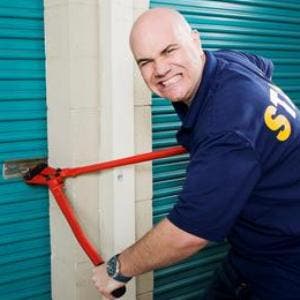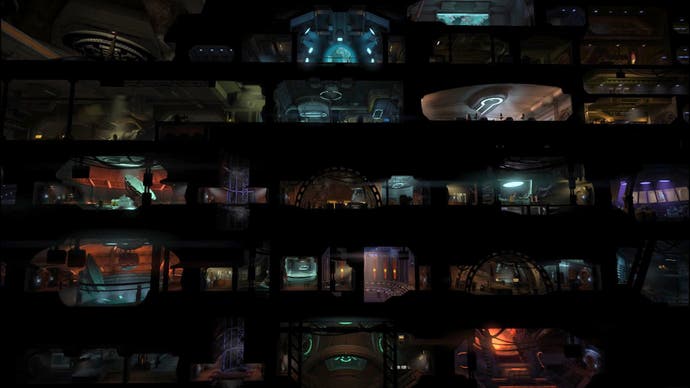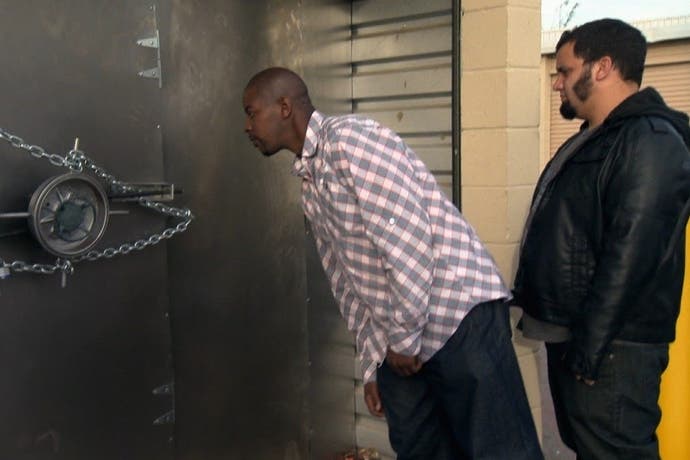I wish more games imitated bad television
Money!
Woody Allen once wrote that life doesn't imitate art, it just imitates bad television. (Astonishingly, I believe he realised this before he married his girlfriend's daughter.) I was thinking about this quote the other day when I was watching Storage Hunters on catch-up. I suddenly thought, "Hey, I wish more games imitated bad television too."
Crucially, though, I want them to imitate the right kind of bad TV. Not the 24 knock-offs that are forever clogging up the schedules. Jack Bauer and all those other neck-breakers are already well catered for in the realms of the cover-based and the QTE-driven.
No, I reckon games could think a little cheaper.
And Storage Hunters is a case in point. Let's pretend for a couple of seconds that you aren't already pathetically addicted to this highbrow documentary series about the human cost of the financial crisis, just so that I can explain the basic concept to you. Right: Storage Hunters is a reality TV show about a bunch of kooks and nutballs who travel around the breezier parts of the US making a living by bidding on the contents of defaulted storage lockers. They get a quick peek inside, and then they have to start waving money in the air based on what they've seen. The show's all about money. (There's even a character called Money, incidentally. His catchphrase is: "Money!")

What do these glorious cheesers eventually win? Anything. Anything and everything: glass-blowing kilns, antique cinema projectors, lots and lots of couches that look like somebody died on them - and then left them to their incontinent dogs, who also died on them.
There are so many reasons to love Storage Hunters. There's the insane brinksmanship between the regulars - a kind of cattle-scrum of sun-burned bargain addicts who make the banter you get at WWE pay-per-views sound like the tinkling bon mots tossed around between the Cambridge spy set of the 1930s. There's the glorious stage-management of the whole production that sees every commercial break foreshadowed by some lunkhead pulling back a tarpaulin and gasping theatrically at their killer score. There are lines like, "But this is really good quality plastic!", uttered by Lori while Brandon, her idiot partner, offers an insane on-the-spot valuation of a department store Santa Claus throne he's just accidentally bought, thinking it was the wing of a small airplane. ("Lori, I could get about 600 dollars for this thing!" From who?) Most of all though, I love Storage Hunters because of its untapped video game potential. I watch it because I can't yet play it.
That's the thing: Storage Hunters is perfect for video games. On the absolute most basic level it's already a sort of roguelike - if you think of permadeath as running out of greenbacks, and status effects as having had a fist fight with a pawn-broker outside of an all-night Denny's after you ate too many breakfast burritos. Someone clever could ensure that the bidding wars are turned into interesting resource-heavy battles, while the characters would fit snugly into the class set-up of a game like Borderlands or Krater. I'm afraid I've thought about this: you could even call the whole thing It's a Tarp!
A Storage Hunters game might not jump-start a new era in video game creativity, but it could still be a lovely prompt towards dependable and traditional mechanics that would in turn be enlivened by the unusual subject matter. Of course, I want games that try entirely new things - I want them more than anything in fact. But if I'm going to have a nice classic genre piece every now and then, why shouldn't the narrative inspiration draw on something a little different to the usual Tolkiens or Clancys, let alone whatever it is David Cage is channeling these days? If we're going to have games built around character interactions, why not broaden the range of potential themes and references, while simultaneously playing to the things that games do well?

And Storage Hunters is not alone. Actually, given the ease with which it conforms to an instantly recognisable type of game, I'm not sure it's even the most promising example. Over on a different channel, there's a show about a very emotional guy who knocks down other peoples' houses while they go away on holiday, and then rebuilds them, but bigger and with glossier bathrooms, and with a kitchen themed around the absent dad's love of Zambonis or major league baseball. Every episode I watch - and I'm not ashamed to say this - lands me in exactly the right kind of puddle of tears. What could a truly imaginative game designer do with that?
Then there's a show about a charming man with complex hair who trawls through the attics of widows before low-balling them for the antique toys he finds up there. And there's Man vs Food, where Adam Richman travels America taking on eating challenges while wearing a truly glorious selection of themed T-shirts. The other day, I'm sure I saw a programme about decking. Decking. I'd play a game about decking. I might even help Kickstart it.
I appreciate that this focus on milieu and gimmickry is proposing a topsy-turvy approach to design that starts from the outside and heads inwards, but still, the reason these things might work as leaping-off points for games is because cheap TV tends to be formulaic at heart. It tends to be mechanistic, but the mechanics, while familiar, often draw their peculiar colour from the program's hook - by revolving around the unusual, the niche, the bizarre.
Storage Hunters is basically a single game encounter played over and over again, and this means that the action has a lovely predictable rhythm shot through with surprising variations - oh man, the other day Money bought a whole passel of guns and then had to give them to Uncle Sam because they didn't have any serial numbers, and then Brandon and Lori accidentally landed a bin full of snakes, thinking it was the wing of a small airplane. It means that the characters are sharp and tangy in that hamburger sauce way TV likes to flavour people. They're all vivid, graspable shorthand, defined by what they do and how they do it. Actually, forget this roguelike bunk, the Storage Hunters lineup is basically a ramshackle version of Street Fighter. (They've even got a lady who looks like an elderly Crimson Viper in the latest series - albeit a Crimson Viper who got herself stuck in a laundrette tumble-dryer for a few hours.)

A while back, while I was visiting Firaxis, Jake Solomon, the XCOM: Enemy Unknown designer, made a distinction that it's worth remembering at this point. He said, "When most people say they have an idea for a game, they often only really have an idea for a story for a game. Soldiers against invading aliens? That's not a game, that's a game story. The game comes in with the design of how the turns work, how the movement works, how the weapons work."
Even so, bad TV could still give the kind of semi-cheap middle-tier games I love so much unusual thematic prompts that might eventually take designers in unusual directions - and at the very least they would deliver narrative arcs in their simplest, most game-friendly forms. These shows are all driven by basic, but surprisingly effective, hooks, after all. You desperately want to know what happens, but - as a potential player - you can rest assured that you won't be called upon to QTE an elaborate set-piece or last-minute plot twist into existence, and you won't have to watch Ellen Page talk to a ghost. Save that stuff for the movies.
Instead, the storyline of a Bad TV Game would unfold through the mechanics, as it does on Storage Hunters or Extreme Makeover: Home Edition. You'll be wondering: Will the house get built? Why does Brandon think everything he sees is the wing of a small airplane? Who wins? These are the kind of plot trajectories that video games are already comfortable with, but instead of spies and hitmen and genetically-modified horrors, you get an influx of new and vibrant clichés to draw from. Oh, and decking. Money!



-3-31-23-screenshot.png?width=291&height=164&fit=crop&quality=80&format=jpg&auto=webp)





